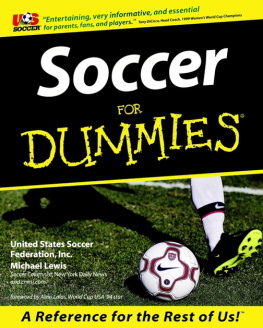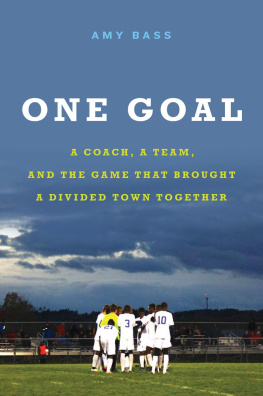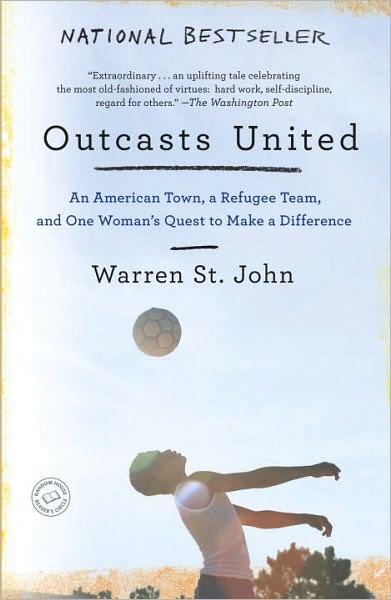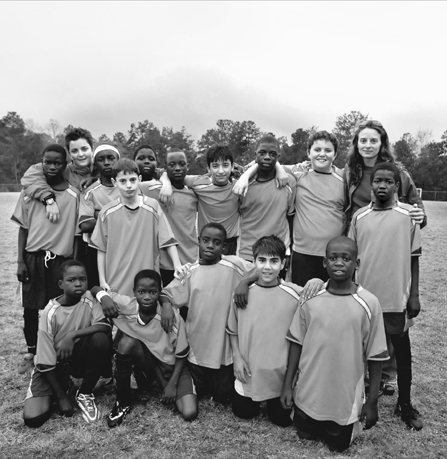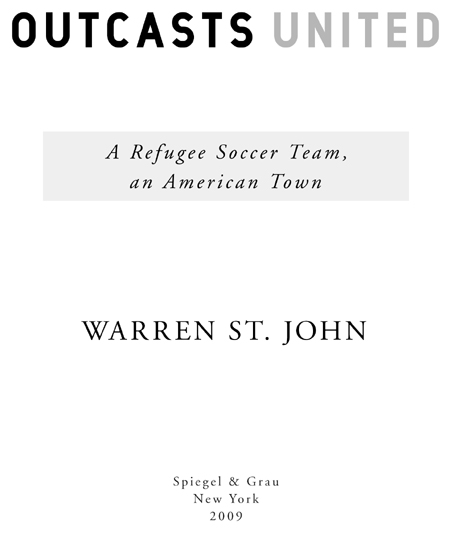Also by Warren St. John
Introduction
O n a cool spring afternoon at a soccer field in northern Georgia, two teams of teenage boys were going through their pregame warm-ups when the heavens began to shake. The field had been quiet save the sounds of soccer balls thumping against forefeet and the rustling of the balls against the nylon nets that hung from the goals. But as the rumble grew louder, all motion stopped as boys from both teams looked quizzically skyward. Soon a cluster of darts appeared in the gap of sky between the pine trees on the horizon and the cottony clumps of cloud vapor overhead. It was a precision flying squadron of fighter jets, performing at an air show miles away in Atlanta. The aircraft banked in close formation in the direction of the field and came closer, so that the boys could now make out the markings on the wings and the white helmets of the pilots in the cockpits. Then with an earthshaking roar deep enough to rattle the change in your pocket, the jets split in different directions like an exploding firework, their contrails carving the sky into giant wedges.
On the field below, the two groups of boys watched the spectacle with craned necks, and from different perspectives. The players of the home teama group of thirteen- and fourteen-year-old boys from the nearby Atlanta suburbs playing with the North Atlanta Soccer Associationgestured to the sky and wore expressions of awe.
The boys at the other end of the field were members of an all-refugee soccer team called the Fugees. Many had actually seen the machinery of war in action, and all had felt its awful consequences firsthand. There were Sudanese players on the team whose villages had been bombed by old Russian-made Antonov bombers flown by the Sudanese Air Force, and Liberians whod lived through barrages of mortar fire that pierced the roofs of their neighbors homes, taking out whole families. As the jets flew by the field, several members of the Fugees flinched.
YOU GUYS NEED to wake up! a voice interrupted as the jets streaked into the distance. Concentrate!
The voice belonged to Luma Mufleh, the thirty-one-year-old founder and volunteer coach of the Fugees. Her players resumed their practice shots, but they now seemed distracted. Their shots flew hopelessly over the goal.
If you shoot like that, youre going to lose, Coach Luma said.
She was speaking to a young Liberian forward named Christian Jackson. Most of the Fugees had experienced suffering of some kind or another, but Christians was rawer than most. A month before, he had lost three siblings and a young cousin in a fire at his familys apartment in Clarkston, east of Atlanta. Christian escaped by jumping through an open window. The smallest of the dead children was found under a charred mattress, an odd detail to investigators. But the Reverend William B. J. K. Harris, a Liberian minister in Atlanta who reached out to the family after the fire, explained that during Liberias fourteen years of civil war, children were taught to take cover under their beds during the fighting, as a precaution against bullets and mortar shrapnel. For the typical American child, under the bed was the realm of ghosts and monsters. For a child from a war zone, it was supposed to be the safest place of all.
Not long before the fire, Luma had kicked Christian Jackson off the Fugees for swearing at practice. Swearing was against her rules. She had warned him once, and then when he swore again, she told him to leave and not to come back. That was how Luma ran her team. Not long after the fire, Christian showed up at the Clarkston Community Center field where the Fugees practiced, and watched quietly from behind a chain-link fence around the playing area. Under normal circumstances, Luma might have ignored himshe gave second chances, but rarely third. But Luma summoned Christian over and told him he could rejoin the team so long as he understood that he was on probation. If he swore again at practice or during a game, he was gone for good. No exceptions. Christian said he understood. This was his first game back.
Luma shouted to her players to gather around her and gave them their position assignmentsChristian was told to play striker, on offenseand they took the field. Forty or so parents had gathered on the home teams sideline to cheer on their boys, and they clapped as their sons walked onto the pitch. There was no one on the Fugees sideline. Most of the players came from single-parent families, and their mothers or fathersusually mothersstayed home on weekends to look after their other children, or else worked, because weekend shifts paid more. Few had cars to allow them to travel to soccer games anyway. Even at their home games, the Fugees rarely had anyone to cheer them on.
The referee summoned the Fugees to the line to go over their roster and to check their cleats and numbers. Luma handed him the roster, and the referee wrinkled his brow.
If I mispronounce your name, I apologize, he said. He ticked through the names awkwardly but respectfully. When he got hung up on a syllable, the boys would politely announce their own names, then step forward to declare their jersey numbers.
A few minutes later, a whistle sounded and the game began.
The head coach of the North Atlanta team was a screamer. From the outset, he ran back and forth on his sideline, barking commands to his players in a hoarse bellow: Man on! Man on! Drop it! Drop it! Turn! Turn! Turn! His words echoed over the quiet field like a voice from a public address system. Luma paced silently on her side of the field and occasionally glanced over at the opposite sideline with a perturbed look on her face. She was all for instruction, but her method was to teach during practice and during the breaks. Once the whistle blew, she allowed her players to be themselves: to screw up, to take chances, and to create. All the shouting was wearing on her nerves.
When North Atlanta scored first, on a free kick, the teams coach jumped up and down on the sidelines, while across the field parents leaped from their folding lawn chairs in celebration: more grating noise. Luma pursed her lips in a tiny sign of disgust and kept pacing, quietly. She made a substitution on defense but otherwise remained silent.
A few moments later, Christian Jackson shook himself free on the right side, dribbled downfield, and fired a line drive into the top right corner of the net: goal. Luma betrayed no reaction other than to adjust her tattered white Smith College baseball cap and to continue pacing. The Fugees soon regained possession; they controlled the ball with crisp passes and moved into range of the goal. A Fugees forward struggled free of traffic to take a shot that flew a good twenty feet over the crossbar and into the parking lot behind the field, and soon after, let loose another that was wide by a similar margin. Luma paced. Meanwhile, with each of his teams shots the North Atlanta coach shouted more instructions to his players, ever more adamantly. He was getting frustrated. If his players had followed his instructions to the word, they couldve scored on Manchester United. But as it was, they ended the first half trailing the Fugees 31.


